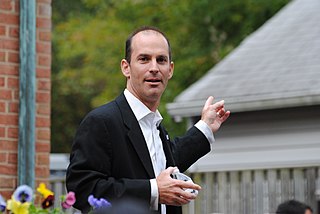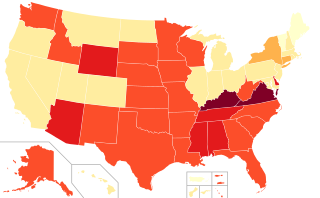
Gerrymandering is a practice intended to establish a political advantage for a particular party or group by manipulating district boundaries.
Disfranchisement is the revocation of suffrage of a person or group of people, or through practices, prevention of a person exercising the right to vote. Disfranchisement is also termed to the revocation of power or control of a particular individual, community or being to the natural amenity they are abound in; that is to deprive of a franchise, of a legal right, of some privilege or inherent immunity. Disfranchisement may be accomplished explicitly by law or implicitly through requirements applied in a discriminatory fashion, intimidation, or by placing unreasonable requirements on voters for registration or voting.

The Virginia General Assembly is the legislative body of the Commonwealth of Virginia, and the oldest continuous law-making body in the New World, established on July 30, 1619. The General Assembly is a bicameral body consisting of a lower house, the Virginia House of Delegates, with 100 members, and an upper house, the Senate of Virginia, with 40 members. Combined together, the General Assembly consists of 140 elected representatives from an equal number of constituent districts across the commonwealth. The House of Delegates is presided over by the Speaker of the House, while the Senate is presided over by the Lieutenant Governor of Virginia. The House and Senate each elect a clerk and sergeant-at-arms. The Senate of Virginia's clerk is known as the "Clerk of the Senate".
David B. Albo is a retired Republican politician from the Commonwealth of Virginia, USA. He represented the 42nd district of the Virginia House of Delegates from 1994 till 2018.

Following the 2005 electoral reform referendum, British Columbia held a second referendum on electoral reform in conjunction with the provincial election on May 12, 2009. In 2018, another referendum was held. As in 2005, voters in 2009 were asked to express themselves on the BC single transferable vote electoral system (BC-STV) proposed by the British Columbia Citizen's Assembly on Electoral Reform to ensure more proportional representation in the provincial Legislative Assembly. British Columbians were asked which electoral system should be used to elect legislators: the existing first-past-the-post electoral system or the proposed STV system.

Jon S. Cardin is an American politician from Maryland and a member of the Democratic Party. He currently serves in the Maryland House of Delegates, representing Maryland's District 11 in Baltimore County. He is a member of the Judiciary Committee and the chair of the Civil Proceedings Subcommittee. He previously represented the same district from 2003 through 2015. During that time he was a member of the Ways and Means Committee and chaired the Election Law Subcommittee. Cardin is the nephew of Ben Cardin, the senior United States Senator from Maryland. In 2014, he ran for Attorney General of Maryland, but lost in the Democratic primary to state senator Brian Frosh.

Jolene Ivey is an American politician who represented the 47th Legislative District in the Maryland House of Delegates from 2007 to 2015. In 2014 she was a candidate for Lieutenant Governor of Maryland, running on the ticket of Attorney General Doug Gansler. In 2018, she was elected to the Prince George's County Council to represent District 5.

Joseline Peña-Melnyk is an American politician who represents District 21 in the Maryland House of Delegates.
Electoral reform in Virginia refers to efforts to change the electoral system in the Commonwealth of Virginia. Virginia has undergone much electoral change since its settling in 1607, many of which were required by federal legislation. However, it remains a relatively conservative state in this respect compared to California and others which have experimented with various alternative systems.
Electoral reform in North Dakota refers to efforts to change the voting laws in this U.S. state. After the 2001 regular session of the North Dakota Legislative Assembly, the legislature formed a bi-partisan interim committee to work on state legislative districts. North Dakota law specifies a minimum of 4,000 signatures to get on the Presidential ballot. In North Dakota, felons' voting rights are restored automatically after release from prison.
Electoral reform in Alabama refers to efforts to change the voting laws in the Yellowhammer State. In 2006, HB 711 was introduced to use preferential ballots for overseas military voters' it was passed by the Alabama House of Representatives. In March 2007, the 11th Circuit Court of Appeals heard arguments as to whether Alabama election law unfairly restricts third-party and independent candidates from the state ballot. Candidates are required to collect signatures from 3% of the total number of voters who voted in the previous gubernatorial election in order to gain ballot access. Ordinarily, such candidates would gather signatures at the polling place at the party primary, but Alabama made it more difficult by moving the deadline for signature turn-in to the date of the primary. Alabama ranks third nationally in disenfranchising formerly incarcerated persons. One out of every 14 Alabama residents is disenfranchised. To regain the right to vote, individuals convicted of crimes of “moral turpitude” who have completed a felony sentence must apply to the Alabama Board of Pardons and Paroles for a Certificate of Eligibility to Register to Vote. As soon as you apply for a Pardon you automatically receive the right to vote back. This is the new rule of law and was passed through the House and the Senate due to voter disenfranchisement. In 2007, HB 192 was introduced to join the National Popular Vote Interstate Compact, but it failed in the Constitution & Elections committee.

Electoral reform in California refers to efforts to change election and voting laws in the West Coast state of California.

Kevin Priola is a legislator in the U.S. state of Colorado. Elected to the Colorado House of Representatives as a Republican in 2008, Priola represented House District 30, which encompassed central Adams County, Colorado, from 2008 to 2012. In the 2012 election, Representative Priola was reelected to the newly redistricted House District 56. Priola served two terms as a state representative in District 56. In 2016, he ran for State Senate in District 25, beating his Democratic opponent with 52% of the vote.
Timothy Douglas Hugo is an American businessman, military veteran, and politician. Since 2003, Hugo serves in the Virginia House of Delegates, representing the 40th district in Fairfax and Prince William counties. It encompasses both the incorporated and unincorporated areas of Clifton in Fairfax County. The district also includes unincorporated parts of Centreville, Fairfax, and Fairfax Station in Fairfax County as well as unincorporated sections of Catharpin, Gainesville, Haymarket, and Manassas in Prince William County. Approximately 80% of the district's population and 65% of its landmass is located in Fairfax County.

The California state elections was held on Election Day, November 6, 2012. On the ballot were eleven propositions, various parties' nominees for the United States presidency, the Class I Senator to the United States Senate, all of California's seats to the House of Representatives, all of the seats of the State Assembly, and all odd-numbered seats of the State Senate.

Felony disenfranchisement in the United States is the disfranchisement due to conviction of a criminal offense, usually restricted to the felony class of crimes, or more generally crimes of incarceration for a duration of more than a year and/or a fine exceeding $1000. Jurisdictions vary as to whether they make such disfranchisement permanent, or restore suffrage after a person has served a sentence, or completed parole or probation. Felony disenfranchisement is one among the collateral consequences of criminal conviction and the loss of rights due to conviction for criminal offense.
Matthew V. "Matt" Hansen is a politician from the state of Nebraska in the Midwestern United States. In 2014, he was elected to the Nebraska Legislature, representing a Lincoln district. Hansen is a member of the Democratic Party.
John Stinner is a politician from the state of Nebraska in the Midwestern United States. In 2014, he was elected to the Nebraska Legislature, representing a district in the western part of the state. Stinner is a member of the Republican Party.
Redistricting in Virginia has been a controversial topic due to allegations of gerrymandering. In the 2017 Virginia General Assembly, all of the redistricting reform bills were killed.











